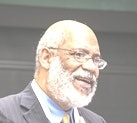 Lovell Jones
Lovell JonesNo one can change the past, but we have the power to change the future if we set our minds to it. Today more than 90 percent of the nation’s population growth is from people of color. Yet we are failing to address the educational needs of these individuals. In the words of Nelson Mandela, “Education is the most powerful weapon you can choose to change the world.” Why are we not using this weapon to address our country’s needs?
Among those attempting to fill the pipeline one student at a time include such individuals as Dr. Rick Cherwitz, founder and director of the Intellectual Entrepreneurship Consortium (IE) in the Division of Diversity & Community Engagement (DDCE), and professor in the Department of Communication at the University of Texas at Austin; Dr. Isaiah Warner, Vice Chancellor for Strategic Initiative, Boyd Professor, and Philip W. West professor of Analytical and Environmental Chemistry, Howard Hughes Medical Institute Professor at Louisiana State University at Baton Rouge; and Dr. Freeman Hrabowski, president of the University of Maryland Baltimore County. But they need help! What is required is not a village, but villages striving for the same thing. What are these individuals doing that others should emulate?
The Intellectual Entrepreneurship is a philosophy and vision of education viewing academics as “innovators” and “agents of change” started by Cherwitz in 1996 as an associate dean in the grad school in 1996. From 1997 to 2003, 5,000 grad students enrolled in our IE courses. Then, starting in 2003, the IE Pre Grad Internship has enrolled about 2,500 students. The program focuses on creating cross-disciplinary and multi-institutional collaborations designed to produce intellectual advancements with a capacity to provide real solutions to society’s problems and needs.
Intellectual Entrepreneurship is academic engagement for the purpose of changing lives. Intellectual Entrepreneurship moves the mission of institutions of higher learning from “advancing the frontiers of knowledge” and “preparing tomorrow’s leaders” to also “serving as engines of economic and social development.” In the process, the role of faculty member and student evolves from that of “intellectual provocateur” to becoming what might be called an “intellectual entrepreneur.”
What is most important is that 72 percent of IE participants are first-generation, underrepresented or economically disadvantaged students. More than 70 percent are women. This is not a coincidence. The philosophy of Intellectual Entrepreneurship shows promise as an approach to increasing the number of persons of color who attend graduate school.
The value of IE as a mechanism for increasing diversity is inherent in its capacity to allow students to become entrepreneurs—to discover otherwise unobserved connections between academe and personal and professional commitments. The spirit of intellectual entrepreneurship seems to resonate with and meet a felt need of minority and first-generation students, facilitating exploration and innovation.
This is something that can also be found in the program started by Warner when he was recruited from Emory University to return to the state of his birth and join the Department of Chemistry at Louisiana State University. In the year 2000, he was appointed to the highest professorial rank in the LSU system (Boyd Professor). In April 2001, he was appointed vice chancellor for OSI with the goal of supporting the high achievements of LSU students, faculty, and staff through education, mentoring, and research. In 2002, Boyd Professor Warner became a Howard Hughes Medical Institute (HHMI) Professor, enabling him to develop and implement an innovative mentoring model for increasing success and persistence in undergraduate STEM education.
This model has been implemented through a number of Office of Strategic Initiatives programs and has proved to be the most effective method at LSU for creating an environment in which all students from diverse backgrounds can thrive. In 2012, LSU Chemistry produced five of the 62 PhDs awarded nationally to African-Americans (one in 12). In 2013, nine African-Americans received LSU PhDs in chemistry. If the national production remains about the same, LSU will have been responsible for one in seven PhDs awarded to African-Americans nationally in 2013. His STEM program has a graduation rate three times that of the national average. Almost 90 percent of the African-Americans in his STEM program graduate. Eighty-four percent of his STEM graduates have completed or are pursuing post-baccalaureate programs.
Hrabowski arrived in 1987 at UMBC as Vice Provost, became Executive Vice President, and finally President in 1992. Within the first two years at UMBC, Hrabowski had raised enough money to set up the Meyerhoff Scholarship Program. Initially designed to help Black males become scientists and engineers, the program he co-founded with Robert Meyerhoff quickly expanded to include students of all races and both genders “who are interested in the advancement of minorities in the sciences and related fields.” The UMBC Meyerhoff family is now more than 1,200 strong, with 800 alumni across the nation and 290 students enrolled at UMBC. Nearly 300 graduates are currently pursuing graduate and professional degrees in STEM fields. As of 2009, Meyerhoff alumni have earned 65 PhDs, 22 MD/PhDs and 65 MDs.
The Meyerhoff program is unique in its funding. But programs initiated by Cherwitz and Warner struggle every year to obtain necessary resources. This seems to be the norm and not the exception for such effective programs. I ask again: Why are we failing to use education as a weapon to address the nation’s needs? At the risk of incensing readers, let me borrow from what I recently wrote about the failure to address the issue of cancer disparities: Is prejudice at the heart of not addressing the nation’s educational needs? If not, where is the real funding for such worthy programs?
Dr. Lovell Jones of the Research Faculty at College of Science & Engineering at Texas A&M University (Corpus Christi) also is Professor Emeritus of the University of Texas M.D. Anderson Cancer Center and University of Texas Graduate School of Biomedical Sciences at Houston.















